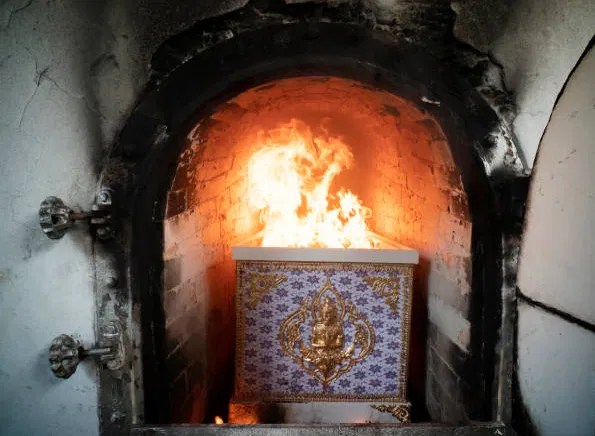The Spiritual Significance of Cremation: Perspectives Across Cultures
The passing of a loved one is a profound event that often prompts deep spiritual contemplation. Among the myriad questions that arise during such times, one that frequently surfaces is: What happens to the soul when the body undergoes cremation? The answer to this question varies significantly based on individual beliefs, cultural backgrounds, and religious teachings. While the act of cremation is a straightforward physical process, the spiritual implications of what follows have been interpreted in an array of ways throughout human history.
Cremation in Hinduism: A Sacred Transition
In Hindu culture, cremation is the predominant practice for handling the deceased. Hindus believe in the concept of the atman, which represents the eternal soul that departs from the physical body upon death. This belief is deeply rooted in the understanding of samsara, the continuous cycle of birth, death, and rebirth. In this context, cremation serves a dual purpose: it facilitates the soul’s separation from the physical form and hastens its journey towards liberation, or moksha.
The ritual of cremation is infused with spiritual significance. Fire, regarded as a purifying element, is thought to cleanse the soul of worldly attachments. As the body is consumed by flames, it symbolizes the release of the atman from earthly constraints, allowing it to embark on its next phase in the journey of existence. This process is often accompanied by specific rites and rituals intended to guide the deceased toward a favorable rebirth.
Buddhism’s Perspective on Impermanence
Similarly, in Buddhism, cremation is favored, albeit with a slightly different philosophical underpinning. The Buddhist doctrine emphasizes the idea of impermanence, suggesting that nothing in life is permanent, including life itself. In this belief system, there is no concept of a permanent soul; instead, there exists a continuous cycle of rebirth driven by consciousness. Cremation in Buddhism is seen as a means to embrace this impermanence, facilitating the transition of consciousness from one existence to the next.
Upon the death of an individual, the act of cremation serves as a reflection of acceptance of life’s transitory nature. The ashes of the deceased may be scattered in nature, further symbolizing the return of their essence to the universe, thereby nurturing the belief in the interconnectedness of all things. This perspective encourages individuals to cherish life while simultaneously recognizing the inevitability of death.
Christianity: Evolving Views on Cremation
Within Christianity, perspectives on cremation have evolved significantly over the years. Historically, many denominations, particularly the Catholic Church, upheld the tradition of burial as the most respectful method for honoring the deceased, primarily due to the belief in the resurrection of the body. However, in contemporary times, many Christian denominations have embraced cremation, as long as it does not signify a denial of the afterlife or resurrection.

Christian theology maintains that upon death, the soul faces judgment and is directed to its eternal resting place—whether that be heaven, hell, or, in the case of Catholics, purgatory. Importantly, the fate of the soul is viewed as contingent upon one’s faith and actions throughout life, rather than the method of the body’s disposal. As such, cremation is increasingly accepted as a legitimate option for those seeking to honor their loved ones while maintaining their spiritual beliefs.
Islamic Views: The Sanctity of Burial
In stark contrast to the practices observed in Hinduism, Buddhism, and Christianity, Islam strictly prohibits cremation. In Islamic tradition, the deceased must be buried as soon as possible after death, reflecting the importance of treating the body with dignity and respect. Muslims believe that the soul departs the body at the moment of death but remains connected to it until the Day of Judgment.
This emphasis on burial signifies not only adherence to religious law but also a demonstration of respect for God’s creation. Cremation is viewed as a violation of this principle and is categorically avoided. The rituals surrounding Islamic burial underscore the communal and familial bonds that persist even after death, reinforcing the notion that the deceased remains a part of the living community.
Spiritual but Not Religious: A Modern Perspective
In recent years, a growing number of individuals identify as spiritual but not religious. For these people, cremation often represents a return to the earth or a natural cycle, devoid of specific spiritual connotations. Many see it as a way to honor the deceased while acknowledging the physicality of life and death. Some propose that the soul merges with the universe, transitions to another dimension, or continues to exist in the memories of those left behind.
For others, particularly those who adopt a scientific or humanistic worldview, the belief is that consciousness culminates with death, making cremation a practical choice. This viewpoint often emphasizes environmental considerations or personal preferences, rather than spiritual implications. Regardless of the rationale behind the choice, the act of cremation can serve as a poignant way to commemorate a life lived.
The Ongoing Mystery of the Soul’s Journey
Ultimately, the question of what truly happens to the soul after cremation remains one of life’s great mysteries. This enigma is shaped by a tapestry of beliefs, traditions, and personal philosophies that influence how individuals perceive death and the afterlife. For some, cremation is a pathway to the next life, while for others, it serves as a poignant farewell or a practical means of honoring a loved one.
As we navigate the complexities of grief and loss, exploring the soul’s journey after death can provide a sense of comfort, hope, and healing. Each belief system offers a unique lens through which we can understand the end of life, enriching our collective experience of love, loss, and the enduring nature of the human spirit.

















